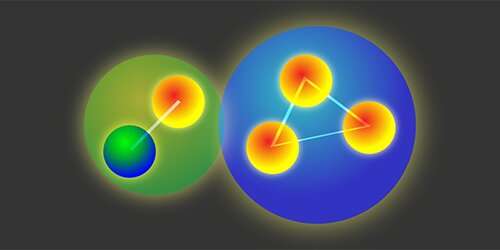A team of researchers working on the LHCb collaboration has found evidence showing that a pentaquark they have observed has a molecule-like structure. In their paper published in the journal Physical Review Letters, the group describes the evidence and the structure of the pentaquark they observed.
Four years ago, a team working at the Large Hadron Collider (LHC) observed what is known as a pentaquark by smashing protons into each other. Its existence had been theorized, but it was not until the right technology was deployed at the LHC that researchers were able to observe it with a reasonable degree of confidence. It was subsequently found to be a particle made up of four quarks and one antiquark. (Quarks are indivisible particles that make up neutrons and protons.)
In this new effort, the researchers have gained a better perspective on the actual organization of the pentaquark. They report that they have nine times as much data from observations as they had when the pentaquark was first observed, so they have high confidence in their findings. They report that the pentaquark was made up of a three-quark baryon and a quark-antiquark meson, and that they were bound together in a way reminiscent of a molecule.










Comments are closed.